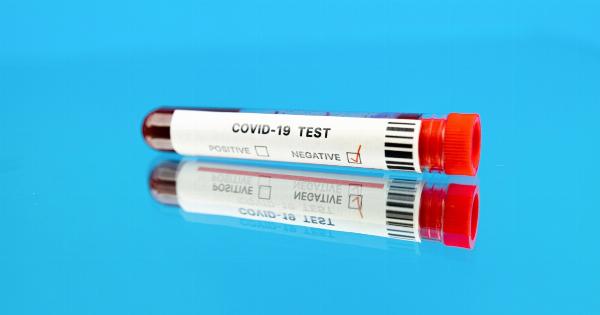When it comes to receiving test results, especially those related to medical issues, there can be a mix of emotions. On one hand, you hope for a negative result, indicating that everything is fine and there is no cause for concern.
On the other hand, a negative outcome could also mean that you still don’t have answers to your health issues. Similarly, a delayed test outcome can leave you feeling anxious and uncertain. In this article, we will delve into the complexities of decoding a negative and delayed test outcome, and offer some guidance on how to cope with the situation.
The Initial Response: Disappointment and Confusion
Receiving a negative test outcome can be both disappointing and confusing. You may have symptoms that led you to seek medical advice, and a negative result might not provide you with the answers you were hoping for.
It’s important to remember that a negative result does not always mean there is nothing wrong. It could simply mean that the test did not detect the specific issue or that further investigation is needed.
Causes of Negative Test Outcomes
There can be various reasons for a negative test outcome. Some common causes include:.
- False negatives: Tests are not always 100% accurate, and there is always a chance of false negatives. This means that despite the presence of an underlying issue, the test fails to detect it.
- Timing: Some tests require a specific window period for accurate results. Taking a test too early or too late can lead to false negatives.
- Testing method: Different tests have varying levels of sensitivity and specificity. A negative result from one test does not exclude the possibility of a positive result from a different test.
- Human error: Mistakes can happen during the testing process, such as mishandling of samples or misinterpretation of results.
- Rare conditions: In some cases, certain conditions may be difficult to diagnose, and standard tests may not be able to detect them.
What to Do Next: Seeking Further Evaluation
If you receive a negative test outcome but continue to experience symptoms or have concerns about your health, it is important to seek further evaluation. Here are some steps you can take:.
- Consult your healthcare provider: Discuss your symptoms, concerns, and the negative test outcome with your healthcare provider. They can review your medical history, conduct a physical examination, and determine if further tests or referrals to specialists are needed.
- Request a second opinion: If you are unsure about the accuracy of the test or its results, consider seeking a second opinion from another healthcare provider. They can provide a fresh perspective and offer different testing options.
- Consider alternative tests: There may be alternative tests available that can provide more accurate results or focus on different aspects of your health concern. Discuss these options with your healthcare provider.
- Keep a symptom journal: Document your symptoms, their severity, and any changes you notice over time. This can provide valuable information for your healthcare provider and help in identifying patterns or potential triggers.
The Challenge of Delayed Test Outcomes
A delayed test outcome can be particularly challenging to navigate. Waiting for the results can trigger anxiety and uncertainty, and the prolonged waiting period can further exacerbate these emotions.
Here are some tips to cope with a delayed test outcome:.
- Practice self-care: Engage in activities that help you relax and reduce stress. This can include exercise, meditation, hobbies, or spending time with loved ones.
- Seek support: Reach out to friends, family, or support groups who can provide emotional support during this waiting period. Sometimes sharing your feelings and concerns can help alleviate anxiety.
- Keep yourself informed: While waiting for the test results, educate yourself about the condition or issue being investigated. However, be cautious with the sources of information and rely on reputable sources such as medical professionals or reputable organizations.
- Engage in distraction techniques: Find activities or tasks that can divert your attention and keep your mind occupied. This can be as simple as reading a book, watching a movie, or pursuing a hobby.
Communicating with Healthcare Providers
Effective communication with your healthcare provider is crucial, especially when you have a negative or delayed test outcome. Here are some tips to enhance your communication:.
- Ask questions: Feel free to ask questions about the test, its results, and possible next steps. This will not only help you gain clarity but also create an open dialogue with your healthcare provider.
- Express your concerns: Share your concerns, fears, and emotions related to the negative or delayed test outcome. Your healthcare provider can offer reassurance or suggest ways to address your concerns.
- Be proactive: Take an active role in your healthcare by being involved in the decision-making process. Work with your healthcare provider to explore different testing options or treatment plans.
- Follow up: Maintain regular contact with your healthcare provider to stay updated on any new developments regarding your case. This will ensure that you are involved in the decision-making process and well-informed about your health.
Coping with Emotional Impact
Receiving a negative or delayed test outcome can have emotional implications. It is natural to experience a range of emotions during this time. Here’s how you can cope with the emotional impact:.
- Acknowledge your feelings: Allow yourself to acknowledge and express your emotions. Do not suppress or ignore them as it can lead to additional stress.
- Seek professional help if needed: If your emotions become overwhelming or start to interfere with your daily functioning, consider seeking professional help from a therapist or counselor.
- Connect with others: Reach out to friends, family, or support groups who have gone through similar experiences. Sharing your feelings and hearing others’ stories can provide comfort and a sense of belonging.
- Practice stress management techniques: Engage in stress-relieving activities such as deep breathing exercises, mindfulness meditation, or journaling. These techniques can help reduce anxiety and promote emotional well-being.
Conclusion
Decoding a negative or delayed test outcome can be challenging, both emotionally and mentally. It is important to remember that a negative result does not always mean there is no underlying issue.
Seek further evaluation, communicate openly with your healthcare provider, and practice self-care during this time. Remember that you are not alone, and with the right support and information, you can navigate through this experience.































